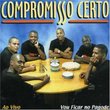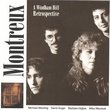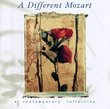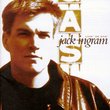| All Artists: Johann Nepomuk Hummel, Mikhail Glinka, Sigismund Thalberg, Charles-Valentin Alkan, Joachim Raff, Ignaz Friedman, Max Reger, Petronel Malan Title: Transfigured Mozart Members Wishing: 0 Total Copies: 0 Label: Hanssler Classics Original Release Date: 1/1/2006 Re-Release Date: 8/8/2006 Album Type: Import Genre: Classical Styles: Opera & Classical Vocal, Chamber Music, Forms & Genres, Fantasies, Historical Periods, Classical (c.1770-1830), Early Music, Modern, 20th, & 21st Century Number of Discs: 1 SwapaCD Credits: 1 UPC: 4010276017998 |
Search - Johann Nepomuk Hummel, Mikhail Glinka, Sigismund Thalberg :: Transfigured Mozart
 | Johann Nepomuk Hummel, Mikhail Glinka, Sigismund Thalberg Transfigured Mozart Genre: Classical
This recording is about the perception of Mozart after his death ? and a very special commemoration for the Mozart Anniversary Year! The transcriptions and free fantasies that Petronel Malan has selected trace Mozart rein... more » |
Larger Image |
CD DetailsSynopsis
Album Description This recording is about the perception of Mozart after his death ? and a very special commemoration for the Mozart Anniversary Year! The transcriptions and free fantasies that Petronel Malan has selected trace Mozart reincarnated and transfigured through the ears, technique, and compositional gifts of seven composers. Chronologically, they range from Hummel, a Mozart pupil, to Friedman, a twentieth-century keyboard virtuoso who survived World War II. Stylistically, the range is equally wide. An exciting and varied program of rare transcriptions and variations inspired by the immortal genius of Amadeus! This is pianist and triple Grammy nominee Petronel Malan?s second album for Hänssler Classic. Her debut disc Transfigured Bach: The Complete Bach Transcriptions of Bartok, Lipatti and Friedman, was nominated for three Grammy awards, including 2004?s Best Instrumental Solo Album. A child prodigy, Malan won her first national gold medal at age twelve. She is a! national icon in South Africa, and now enjoys an international career. Similar CDs
Similarly Requested CDs
|
CD ReviewsPetronel Malan's Tribute to Mozart via Rare Piano Transcript Hexameron | 11/02/2006 (5 out of 5 stars) "Petronel Malan is a somewhat obscure South-African pianist who has recently entered the spotlight with her debut album Transfigured Bach, which was nominated for three Grammy awards. The present "Transfigured Mozart" release is another volume in this clearly ongoing "Transfigured" series (she is currently working on a "Transfigured Beethoven"). Unlike other pianists who churn out CD's of the same old transcriptions, Malan is making world premiere recordings with some of her repertoire choices. Instead of taking the normal route of Liszt's or Busoni's Mozart transcriptions/fantasies, she unearths pieces from the likes of Hummel, Glinka, Thalberg, Alkan, Raff, and even Ignaz Friedman.
Cyprien Katsaris recorded similar rarities on his Mozartiana disc, but Malan goes a little further by showcasing some obscure fantasies as well as exquisite transcriptions from lesser-known composers. Of all the arrangements featured, Alkan's, Thalberg's and Friedman's are the most outstanding. Charles-Valentin Alkan (1813-1888) is currently the rage with today's connoisseurs of the piano literature. For all his demonic and technically impossible virtuoso pieces, it's interesting to hear his straightforward piano transcription of the "Andante" movement from Mozart's String Quartet K. 464. The transcription is utterly magnificent and expertly arranged. There are not too many significant alterations, but the dramatic music content is spellbinding on the piano. Sigismund Thalberg (1812-1871) wrote a number of transcriptions of vocal numbers from works of Beethoven, Bellini, Stradella, Pergolesi, and Mozart for his Op. 70 "The Art of Singing Applied to the Piano." I've heard Liszt's famous transcription of the Requiem's "Lacrymosa" number, but Thalberg's is more effective with its starker textures. Malan plays this with profound feeling and hair-raising power in the climax. The two transcriptions by Ignaz Friedman (1882-1948) are imprinted with a blatant Romantic signature, but the music of Mozart is not muddied by it. The immortal melodies of the "Romanze" movement of K. 525 ("Eine Kleine Nachtmusik") and the "Menuetto" from K. 334 are simply gorgeous. Malan's playing is tender and definitely emphasizes "Romantic" rather than "Classic" lyricism. The three salon works by Hummel, Glinka, and Raff are less memorable than the preceding transcriptions, but still attractive. Hummel's "Fantasina on a Theme of Figaro" has been recorded before on the Naxos label (Hummel: Fantasies), but I think Malan plays with agreeable brio and joy. The Glinka "Variations on a Theme of Mozart" is brief but charming in the manner of Beethoven or Schubert. I think Joachim Raff (1822-1882) is a fine composer but one whose output is too uneven. His "Souvenirs of Don Juan" is better than most vapid operatic potpourris, but lacks the grandiose virtuosity-on-sleeve traits that Liszt's monumental "Reminiscences of Don Juan" has. Instead, Raff's treatment of each operatic theme is harmonically conventional and pianistically restrained. Max Reger (1873-1916) may probably be the strangest bedfellow with Mozart. His "Variations and Fugue on a Theme of Mozart" is a substantial 26-minute composition worthy of many listenings. But the pervasive dissonant counterpoint may irk a few listeners who have never encountered his music before. Half-way through, Reger's neoromantic harmonies and Germanic contrapuntal style supplants any hint of Mozart (at least on the surface). Nevertheless, the variations show phenomenal scope, polyphonic muscle, and finish with a spectacular fugue that would please Busoni. Bottom line: For world premiere recordings of pleasing virtuoso fantasies and transcriptions based on Mozart, this recording is an important addition to the discography. Petronel Malan's playing is truly formidable. She clearly loves Mozart's music and understands his idiom. Since she's playing profusely Romantic arrangements, I think her legato and lush phrasing work well, especially in the Alkan, Thalberg, and Friedman." |

 Track Listings (20) - Disc #1
Track Listings (20) - Disc #1












![Don't Stop The Carnival [ENHANCED CD]](https://nationalbookswap.com/cd//m/07/7307/347307.jpg)